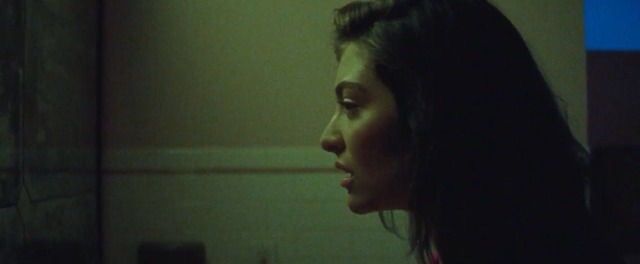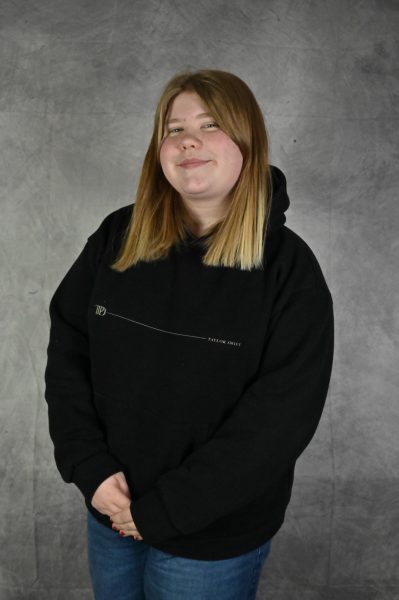Melodrama is an album full of electric pop. The album is a fan favorite and has become iconic in Lorde’s career. The album has many sounds, often changing between somber piano songs and electric pop music, all accompanied by Lorde’s voice.
“Her raspy voice is so unique to me, and I love how she uses her vocal range,” Harmony Williams said.
Melodrama by Lorde is an 11-track show-stopping album.
The album opens with the song “Green Light,” about Lorde’s first significant heartbreak and her last years of being a teenager. The song recaps her relationship and her emotions after the breakup, consisting of ill-will and how she feels as though she sees them everywhere.
She continuously says that she is waiting for a green light to come and signal that she can let all the built-up emotions go. This song features immense emotion, and it is all so perfectly conveyed in Lorde’s voice and her lyrics.
You can feel the betrayal she experiences as you listen to her sing, and it is so powerful yet done with such ease.
The second track, “Sober,” is an electric pop song about going out and having fun with someone you’re in a relationship with. She recalls the things they do when out and how nothing can match the rush they feel.
The song illustrates the weekend club scene and treats the weekdays as being sober due to the lack of freedom and need for responsibility. The music cannot help but get you out of your seat, dancing and feeling the same exhilaration and joy Lorde is singing about.
Much like the second track, “Homemade Dynamite” is very electric and covers partying. Lorde described it as about meeting someone at a party and having an explosive night. It is a simple yet bold song about having a fun night and being wild.
“‘Homemade Dynamite’ is my favorite on the album because the main chorus has such a freeing vibe, and it is such a fun song,” Williams said.
Getting back to more meaningful lyricism is the fourth track, “The Louvre,” which goes over themes of obsession and worry in a still-happy relationship. Lorde describes herself as having a psychopathic crush and talks about all the ways she devotes herself to the relationship at hand.
She wants everyone to know how in love she is and uses the lyrics “but we’re the greatest, they’ll hang us in the Louvre down the back, but who cares? Still the Louvre,” which equates their love to art worthy of being in one of the most famous museums ever and even though it may not be front and center or capture the eyes of everyone it’s still important and worthy enough of such an honor, much like hanging up in the Louvre.
I love how Lorde goes through the relationship in such detail. She blames both association members for several things, but she is in love, and it is a great love.
Halfway through the album, a turn is taken with the song “Liability.” It’s a personal piano ballad and one of my favorites of Lorde’s work. She sings about having a big personality and pushing people away. She talks about being her own best friend due to being a bit too much for others to deal with.
My favorite lyric from this song is “We slow dance in the living room, but all that a stranger would see is one girl swaying alone, stroking a cheek” because it emphasizes that she’s alone regarding the friendships in her life.
She has to keep herself company and fulfill her needs, which a friend or partner may assist with, but she is content in her lonesome. This song is different from the previous electric pop songs, but it is so deep and easily applicable to those who feel alone in life or too much for some.
Staying with the downer lyrics but allowing the comeback of the pop sound is the two-part song “Hard Feelings/Loveless.”
Both parts of the track go over the emotions of a past relationship of Lorde’s. While the first part features her coming to terms with the breakup and overcoming the overwhelming sadness, the second part is messy. It discusses a more carefree and casual relationship.
This song has so many layers, and it is unique to make it a song that features a change of tone instead of breaking it up into two completely different tracks. Still, it allows for an exciting listening experience and something out of the ordinary, which I feel like Lorde often does in her music.
“Sober II” is a much more melancholy take on the themes of its counterpoint track. It keeps some pop music, but the lyrics discuss the feeling after a fun night when the lights are turned on, and you are left with the aftermath to clean up—the mistakes and mess of the night before.
Lorde beautifully juxtaposes the two songs and tells a dramatic story with the words about the party life she enjoys. The lyric “We told you this was melodrama” gets repeated as the song fades out, equating the evening to be much more dramatic and over the top than it may have indeed been.
Another absolute favorite of mine is “Writer In the Dark,” another slow lamenting song. She sings about her ended relationship, how she cannot get over them, and how she is deeply in love with them.
My favorite part of the song is the gut-wrenching comparison to her mother in which she achily sings, “I am my mother’s child, I’ll love you ’til my breathing stops, I’ll love you ’til you call the cops on me,” to emphasize her obsession with her ex.
She ends it by saying she knows she’ll get over the relationship and that her ex must regret being with her because of this intense struggle on her end.
My number one track from this album is “Supercut,” which is about looking back on a relationship and realizing that you’re only thinking about the good parts, and that is all you can replay in your head.
It’s all about being blinded by emotions and seeing what you wanted it to be instead of what it was. While this song may not have the happiest message, and it is heartbreaking to look back on a relationship and see a sort of false reality, I do find it some kind of lovely to ignore the bad and replay not just the good but the amazing, the best of the best you can say.
She uses the lyric, “when you call, I’ll forgive and not fight, because ours are the moments I play in the dark,” and she doesn’t want to look back on the negative.
“Liability (Reprise)” beautifully reimagines the lyrics of the previously played track. Much like the original, Lorde self-reflects on her and her relationship with herself. It is a concise song going over the topic, except she discusses how difficult this loneliness can be, but she also writes about turning her struggles into pieces. How it finds her listeners, and even that can influence her negative feelings of isolation.
The last track of this album is “Perfect Places,” just like its title, it is a perfect closer to this complex album. It restates many of the album’s themes with the same emotion and electric pop mix.
The lyrics summon back the party scene and relationships Lorde previously sings about and her loneliness. There is not much more to say about this track besides Lorde’s skilled lyricism and restating, tying together the whole album with a bow.
“The songs on the album are really clever and well-rounded because she covers all the emotional bases,” Kennedy Vargas said.

